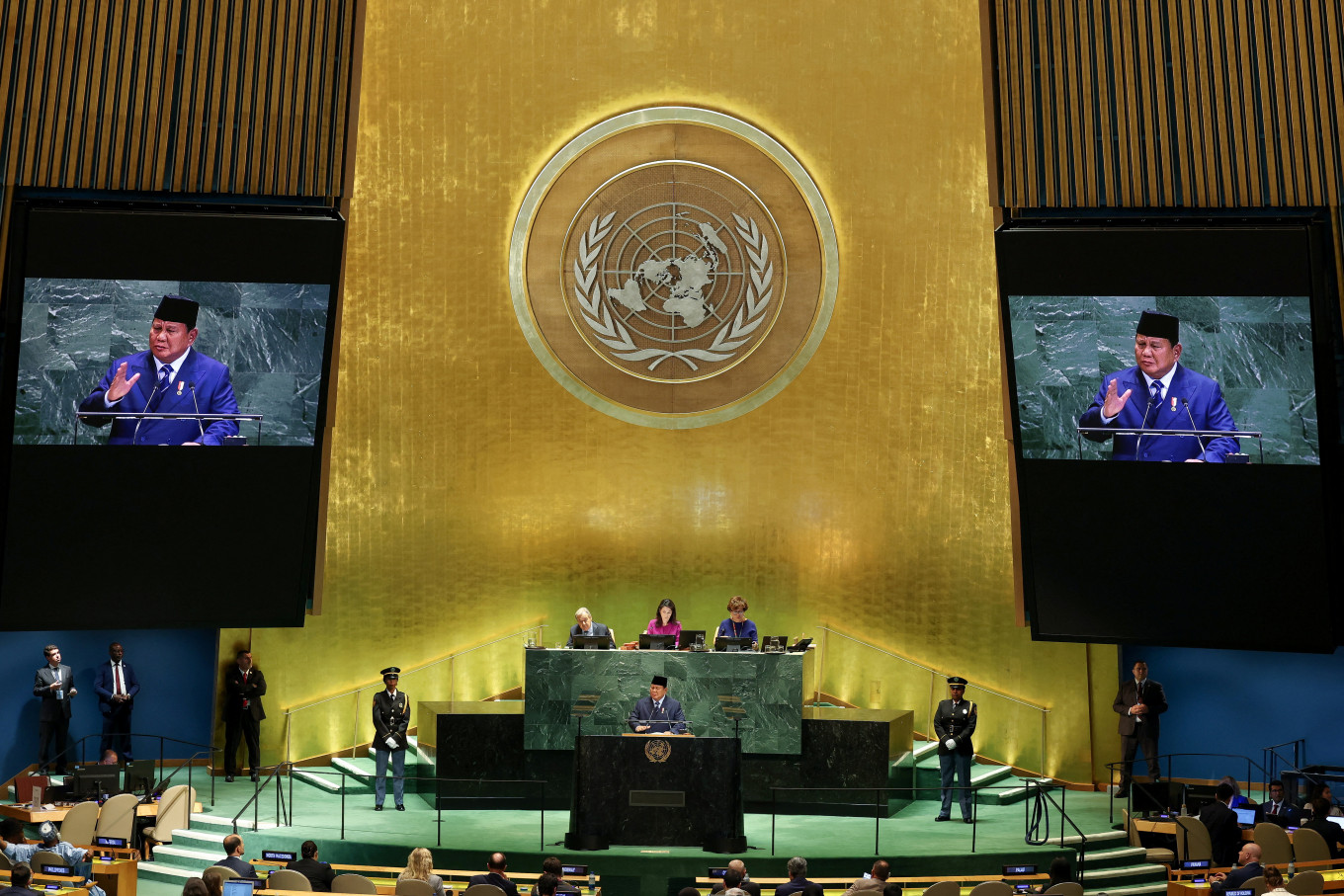Popular Reads
Top Results
Can't find what you're looking for?
View all search resultsPopular Reads
Top Results
Can't find what you're looking for?
View all search resultsHow Indonesia can navigate the new world order in the making
Indonesia must preserve its strategic autonomy to balance relations among major powers, mitigate potential risks and safeguard its national interests amid growing uncertainty.
Change text size
Gift Premium Articles
to Anyone
I
n his powerful debut at the United Nations General Assembly, President Prabowo Subianto delivered a striking message about the deep uncertainty shaping today’s global politics. His speech particularly highlighted concerns over a tectonic shift in the geopolitical landscape.
The gist of the speech was a determination to develop a more responsive foreign policy. To this end, Indonesia’s foreign policy must be equipped with a strategic approach capable of anticipating and adapting to such dynamics.
Within this context, the epochal shift should not be perceived as a path toward the disappearance of world order. In fact, some form of world order will always exist. The world will continue to function according to a particular order.
What is really happening is that the existing world order is currently unravelling. The emergence of a new world order is now coming into play, though no one can predict exactly what it will look like.
Unlike the post-Cold War world order, the emergence of this new world is no longer defined by a single country, and no one is able to achieve hegemony. Instead, a new era of multipolarity emerges, in which a wider array of actors, particularly Global South nations, have become more influential in shaping this new global order.
In this multipolar world, the dynamic is not merely a rearrangement of geopolitical actors. It also represents a great transformation of global governance that is more complex and contested.
Such geopolitical realignment is also fragmented, with many nations pursuing unilateral and transactional agendas. Unsurprisingly, countries from the Global South are looking at alternative groups such as BRICS and the Shanghai Cooperation Organization.
Moreover, the broader economic shift has further deepened the fractures in the world order. The era of Western industrial dominance is fading, as many countries in the Global South emerge as the engines of global growth. Alongside their growing economic influence, regional trade agreements among these nations are reconfiguring international economic governance.
On top of all this, the frontier of international politics has expanded as a result of unprecedented technological transformation. Advances in artificial intelligence, renewable energy and digital connectivity are becoming power currencies and creating new arenas for competition and collaboration.
At the same time, growing skepticism toward the existing world order is also instigated by the failure to address Israel’s complete disregard for international law, along with increasingly assertive unilateral actions by the United States.
This skepticism results in the erosion of moral authority and the legitimacy of the liberal foundations underpinning the world order. Ultimately, such dynamics contribute to the declining influence of Western countries.
Such decline has been considered by many as a road to world disorder. This view is closely related to the notion that world order is associated with stability. For that reason, the fear of chaos has dominated the narrative of the need to preserve the US-led world order at all costs.
Against this backdrop, Amitav Acharya in The Once and Future World Order strongly argues that the decline of the West will not necessarily lead to global chaos. The chaos versus order narrative defines much of the Western fear about the end of its dominance and the rise of other nations. Such anxieties are the result of the West’s overconfidence and hubris.
A multipolar world is indeed not a chaotic one. It is a factually accurate reflection of the real world, a world where no single nation, but rather multiple centers of influence, will shape the course of global affairs. The challenge is how to prevent complexity from slipping into conflict and instead evolving into cooperation.
It is true that strategic competition between great powers is inevitable. Yet, this does not mean that chaos or conflict is unavoidable.
History teaches us important lessons. In his book Destined for War: Can America and China Escape Thucydides’ Trap?, Graham Allison explains that over the past 500 years, there have been 16 times when a rising power challenged the world order set by a leading power.
In 12 of those cases, the result was war. But in four cases, the leading powers were able to manage their strategic competition and avoid war. Although war was more likely in most cases, there were still great chances of avoiding conflict when big powers managed their competition carefully.
In a time of such high uncertainty, diplomacy becomes more complex as countries must navigate an increasingly fragmented world order. Those able to approach this evolving landscape with adaptability, foresight, and cooperation will thrive in the multipolar future.
This situation calls for Indonesia to recalibrate its foreign policy by adopting a more assertive and innovative approach to diplomacy. Far from being just a catchphrase, such an approach remains firmly guided by the principle of bebas aktif (free and active).
This means Indonesia must preserve its strategic autonomy to balance relations among major powers, mitigate potential risks and safeguard its national interests amid growing uncertainty. Rigid and irreversible commitments with competing powers should be approached with caution. In line with this, Indonesia must transform itself to become an active and influential player on the global stage.
***
The writer is a senior Indonesian diplomat. The views expressed are his own.











